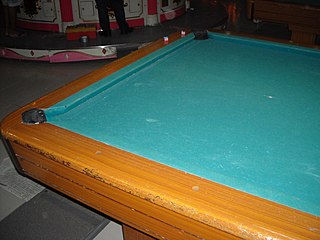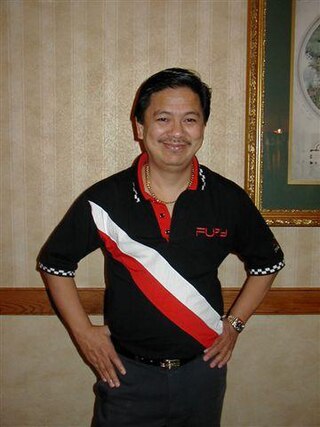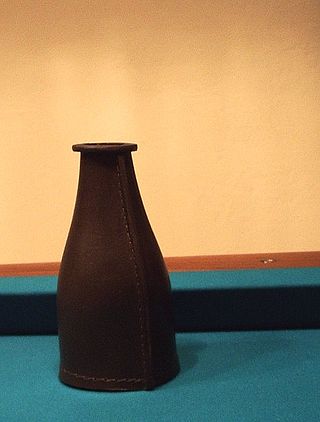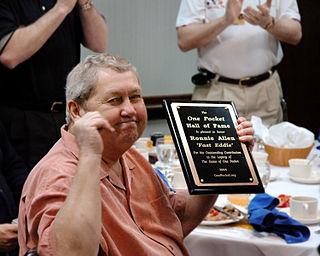Related Research Articles

Efren Manalang Reyes, popularly known by the nicknames "Bata" and "the Magician", is a Filipino professional pool player, who is widely regarded as the greatest pool player of all time, and especially famed for his skill at the challenging one-pocket discipline. In 2003, he was inducted into the Billiard Congress of America's Hall of Fame.

William Joseph Mosconi was an American professional pool player from Philadelphia, Pennsylvania. Mosconi is widely considered one of the greatest pool players of all time. Between the years of 1941 and 1957, he won the World Straight Pool Championship nineteen times. For most of the 20th century, his name was essentially synonymous with pool in North America – he was nicknamed "Mr. Pocket Billiards" – and he was among the first Billiard Congress of America Hall of Fame inductees. Mosconi pioneered and regularly employed numerous trick shots, set many records, and helped to popularize pool as a national recreation activity.

One-pocket is a pool game. Only one pocket for each player is used in this game, unlike other games played on a pool table where any pocket can be used to score object balls. The object of the game is to score points. A point is made when a player pockets any object ball into their designated pocket. The winner is the first to score an agreed-upon number of points.
Edmond Hoyle was an English writer best known for his works on the rules and play of card games. The phrase "according to Hoyle" came into the language as a reflection of his broadly perceived authority on the subject; use of the phrase has since expanded to any appeal to a putative authority.

Pool is a classification of cue sports played on a table with six pockets along the rails, into which balls are shot. Each specific pool game has its own name; some of the better-known include eight-ball, blackball, nine-ball, ten-ball, seven-ball, straight pool, one-pocket, and bank pool. Eight-ball is the most frequently played discipline of pool, and is often thought of as synonymous with "pool".

Novuss is a two-player game of physical skill which is closely related to carrom and pocket billiards. Novuss originates from Estonia and Latvia, where it is a national sport. The board is approximately 100 centimetres (39 in) square, typically made of wood, has pockets in each corner, and lines marked on the surface. The board is usually placed on a stand, but may be placed on a barrel or other surface that allows the pockets to hang down properly. It uses small discs instead of balls, and each player has a small puck instead of the cue ball used in other cue sports. Players use a small cue stick to propel their pucks into their colored object discs, knocking them into the pockets. The winner is the first one to sink all eight of their object discs.

Jose Parica is a Filipino professional pool player from Manila, nicknamed "Amang" and "the Giant Killer." As a Filipino Hall of Famer, he pioneered the "Filipino invasion" in the United States in the late 70s, especially in the game of Nine-ball. Also known as "the King" in the Philippines, Parica is considered one of the greatest money players and one-pocket player of all time. He became the Billiards Digest Player of the Year in 1997.

Frank Fenter was a South African music industry executive.

Kelly pool is a pool game played on a standard pool table using a standard set of 16 pool balls. Gameplay involves players each drawing one of 16 numbered markers called peas or pills at random from a shake bottle, which assigns to them the correspondingly numbered pool ball, kept secret from their opponents, but which they must pocket to win the game. Kelly pool is a rotation game, which means that players must contact the lowest numbered object ball on each shot first until the opportunity to pocket their own is presented. If a player draws the number 16, this player is assigned the cue ball. In order to pocket the cue ball, the player must contact the lowest ball first and in the same shot, pocket the cue ball. However, the game is commonly played by removing the pea numbered 16 and playing with the basic 15 numbered balls and corresponding peas. Two rule variants are set forth under rules promulgated by the Billiard Congress of America (BCA). In the simpler form, the object of play starts and ends with the goal of pocketing one's secret ball. In the second, in addition to the goal of pocketing one's secret ball, points are scored in various ways. In the instance where pills are unavailable, a cloth may be used to cover the balls, which are then chosen blindly, recorded, and replaced for play.

Bottle pool, also known as bottle-billiards and bottle pocket billiards, is a hybrid billiards game combining aspects of both carom billiards and pocket billiards. Played on a standard pool table, the game uses just two object balls, a cue ball, and a 6+3⁄4 inches (170 mm) tall, narrow-necked bottle called a shake bottle or tally bottle, traditionally made from leather, that is placed on the table and used as a target for caroms. Those unfamiliar with the game sometimes mistakenly use its name as a synonym for the very different game of kelly pool. Bottle pool has been described as combining "elements of billiards, straight pool and chess under a set of rules that lavishly rewards strategic shot making and punishes mistakes with Sisyphean point reversals."

Keith McCready is an American professional pool player who played under the nickname "Earthquake". At one time considered among the top players in America, McCready has been a traveling tournament competitor and notorious hustler since the 1970s. Known for comedically interacting with the audience during matches, McCready was also a contributing writer for InsidePool magazine between 2003 and 2006. He also had a supporting role as the hustler Grady Seasons in the 1986 film The Color of Money.
Luther Clement Lassiter Jr., nicknamed Wimpy, was an American pool player from Elizabeth City, North Carolina. The winner of seven world pocket billiard championships and numerous other titles, Lassiter is most well known for his wizardry in the game of nine-ball and is widely considered one of the greatest players in history, He was inducted into the Billiard Congress of America's Hall of Fame in 1983. That same year, he was also inducted into the North Carolina Sports Hall of Fame. He was ranked number 9 on the Billiards Digest 50 Greatest Players of the Century.

William "Bill" Paul Staton, was an American professional pool player and restaurateur, nicknamed Weenie Beenie.
Billy Joe "Cornbread Red" Burge, was an American pool player. Inducted into the One-pocket Hall of Fame in 2004 and the Bank Pool Hall of Fame in 2005, Cornbread Red is revered as "one of the most talented characters in the history of pool" and considered as one of the hustlers.
James William Moore, known as "Cowboy Jimmy Moore", was a world-class American pocket billiards (pool) player originally from Troup County, Georgia, and for most of his life a resident of Albuquerque, New Mexico, best known for his mastery in the game of straight pool.
Danny DiLiberto is an American retired professional pool player nicknamed "Buffalo Danny".
Steve Cook, was an American professional player and instructor of pocket billiards (pool). He is best known for the extremely challenging game of one-pocket, which Cook described as "the pool game for strategical and creative abilities." He was nicknamed "Cookie Monster", and due to his unassuming appearance hiding world-class talent, "the Clark Kent of one-pocket". Cook was inducted into the One Pocket Hall of Fame in 2005. World champion Allen Hopkins said Cook was one of the best One-Pocket players in the world in the 1970s.

Ronnie Monroe "Fast Eddie" Allen was an American professional pool player. He was labeled as a pool "super star" in the prime of his pool-shooting career by his peers during pool's golden era.

Jimmy Reid was an American professional pool player. He was given the Lifetime of Pool in Action Award at the One Pocket Hall of Fame banquet in Louisville, Kentucky. His nicknames were "Hippie Jimmy" and "Diamond Jim".

Billy Incardona is an American professional pool player.
References
- 1 2 3 4 5 6 7 Onepocket.org Hall of Fame, Hayden Lingo, http://www.onepocket.org/HaydenLingoHOF.htm, accessed September 19, 2015.
- 1 2 Fred Walther: Wanderon, Xlibris Corporation, September 12, 2008, 244 pp.; p. 202; https://books.google.com/books?id=vJrq2oS1fvAC&q=Wanderon+%22Hayden+Lingo%22%2C&pg=PA202 accessed September 19, 2015.
- ↑ Steve Booth: Rack 'em up with Eddie Taylor, part 1, OnePocket.org, 2004, http://www.onepocket.org/EddieTaylorInterview.htm, accessed September 19, 2015.
- ↑ Hayden W. Lingo, How to Play One Pocket in Pocket Billiards. 13 leaves; April 3, 1963; pamphlet A620112, Library of Congress, Copyright Office, Catalog of Copyright Entries, Third Series: 1963: January–June, p. 498. URL: https://books.google.com/books?id=RhwhAQAAIAAJ&dq=%22Hayden+W.+Lingo%22&pg=PA498
- ↑ U.S. Department of Veterans Affairs: Beneficiary Identification Records Locator Subsystem (BIRLS) Death File, Washington, D.C.